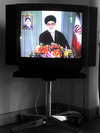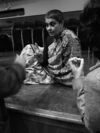From Birmingham to Tehran
by SOHRAB AHMARI
19 Jan 2010 05:4418 Comments
 Reflections on Dr. King's Influence on the Pro-Democracy Movement in Iran
Reflections on Dr. King's Influence on the Pro-Democracy Movement in Iran
"The aftermath of nonviolence is the creation of the beloved community. The aftermath of nonviolence is redemption. The aftermath of nonviolence is reconciliation. The aftermath of violence is emptiness and bitterness." -- Dr. King
[ opinion ] As the United States celebrates Dr. Martin Luther King, Jr. Day, it's worth wondering whether the great civil rights leader would equate the American present with his "beloved community" where children "will not be judged by the color of their skin but by the content of their character." The U.S. has certainly made tremendous strides -- including the election of an African-American president -- towards realizing Dr. King's dream. Nevertheless, deep racial inequality in the form of de facto -- if not de jure -- segregation persists in many areas of American life, particularly housing and education. Dr. King's struggle, then, should retain its resonance for generations of Americans to come.
But Dr. King's legacy is also an international one. His bequest to the world is a comprehensive methodology for effecting social change that has inspired people of conscience everywhere seeking to assert their universal rights. The nonviolent strategies Dr. King and his associates pioneered in their fight against American Apartheid have been put to good use by activists across the planet to challenge autocratic governments, reduce gang-related violence, and achieve post-colonial reconciliation.
Iran today is arguably the most vital proving ground for Dr. King's ideas. The Iranian Green Movement has consciously transposed to its setting techniques once used by African-Americans to face down vicious white deputies and their attack dogs. In Iran, the role of the southern deputies is taken up by the baton-wielding Basijis, who mercilessly veer their motorcycles into crowds and indiscriminately beat protestor and bystander alike. As numerous YouTube videos attest, the Iranian protesters more often than not retain the moral high ground by refusing to use violence against the Basijis they capture; rather, the people offer water and tend to their brutalizers' wounds.
Dr. King's historic March on Washington too has been matched by the solemn and awe-inspiring silent march of hundreds of thousands of Tehranis toward Meydan-e Azadi on the 25th of Khordad. And the Alabama bus boycott has found its Iranian version in the form of throngs of Tehrani commuters spontaneously erupting into "Ya Hossein, Mir Hossein!" and other opposition chants as they wait for the subway.
The faith-based dimension of Dr. King's activism has been paralleled by the Green Movement's re-appropriation of Islam as a liberatory faith. As Abbas Milani has explained, "[t]hinkers and theologians identified with the democratic movement have been offering a new reading of Shiism that makes the faith more amenable to democracy and secularism." Just as Dr. King's struggle against American Apartheid was rooted in his conviction that "all of God's children" deserve full civil rights, so the Iranian democrats have sought to discover a Shiism which condemns suppression of dissent, discrimination against women and minorities, and state-sanctioned brutality.
As the regime ominously vows to unleash even more violence against dissidents, it is important to note that Dr. King did not just leave behind a tactical toolkit for civil disobedience and nonviolent protest. He also offered a holistic vision of social transformation and transition that can provide powerful moral and practical guideposts for the Green Movement today. Reconciliation and forgiveness are critical components of this vision.
Some Iranians rightly fear that the potential fall of the Islamic Republic, like that of the Shah, might give way to yet another tyranny or worse. If and when the Islamic Republic does collapse under the weight of ever-growing popular discontent, the new generation of Iranian change agents can avoid the tragic mistakes of the 1979 generation by hewing closely to King's guideposts.
This might mean, for example, that even the very worst human rights offenders in the previous regime be afforded the right to fair trials and procedural safeguards -- despite the fact that many such offenders have denied these same rights and safeguards to the Iranian people for some three decades. It may also involve the recognition that Islam is likely to remain a part of Iran's political culture, even under a post-Islamic Republic democracy. This recognition should in turn lead to an understanding that attempts to forcefully banish religious parties from the polity are likely to backfire and lead to future instability.
Finally, Dr. King's warning that "injustice anywhere is a threat to justice everywhere" should be a clarion call for people and governments of conscience around the world to continue to stand in solidarity with the Iranian pro-democracy movement.
Sohrab Ahmari is an Iranian-American blogger and Northeastern University law student.































18 Comments
well whether anything remains of Islam is yet to be seen. I am not sure why do we have so many Islam preservers? who benefits from political Islam? Certainly not Iranian people..but probably some outsiders. Well excluding those that are paid by the current government...
Even religious people in iran want religion to go back to mosques for anyone who wants to practice it.
Now everything is upside down. Our real life is private and our private life (religion) is ruling public.
Nioosha / January 19, 2010 6:49 AMwell whether anything remains of Islam is yet to be seen. I am not sure why do we have so many Islam preservers? who benefits from political Islam? Certainly not Iranian people..but probably some outsiders. Well excluding those that are paid by the current government...
Even religious people in iran want religion to go back to mosques for anyone who wants to practice it.
Now everything is upside down. Our real life is private and our private life (religion) is ruling public.
Nioosha / January 19, 2010 6:49 AMA small aside:
When Dr. King was asked about the inspirations for his non-violent methods was, he had replied the writings of Mahatma Gandi.
When Gandi was asked about his inspirations, he had recited Saadi in "Children of Adam are...".
Nice to maybe a see full circle circumscribing this triangle.
Peace to those who use force of truth over force of arms. Truth always wins.
nassim sabba / January 19, 2010 7:18 AMWell said. The more this process of peaceful resistance continues, the more apt the comparison to a civil rights movement becomes. Your assessment about Islam having to somehow be a part of any post-Islamic Republic also rings true. We may not all agree with it idealogically, but the great majority of Iranians ARE observant Shias. Everyone needs to be accounted for in a truly representative democracy. And I can't agree more with the idea of affording the perpetrators of crimes in this regime with transparent and fair trials. It is one of the only ways for Iranians to show as a nation that we have matured politically and moved beyond the backwards days of Shah/IRI persecution of political opponents, torture, unlawful jailing etc. This would afford a rock-solid legitimacy to the government that would be hard to shake.
On a lighter note, let us see just how long it takes for the resident monarchists to illogically smear this article with vitriolic rage because they perceive it as anti-Shah/RP/'constitutional' monarchy.
Mirza Kuchak / January 19, 2010 6:09 PMNioosha,
I'm all for secular democracy. But to forcefully exclude religion -- even within a secular-democratic framework -- strikes me as fundamentally misguided in a country where a significant portion of the population self-identifies as religious.
Sohrab Ahmari / January 19, 2010 7:16 PMvery well written article.
I also think religion is a private matter and should gain its status by going back to mosque. Let's hope for a muti-party Iran where all Iranians are accepted irrespective of their religion. Meaningful laws and laws that respect human rights, justice and peace are the main core of religion and the details better go away.
There is also no need to have any "Islamic" condition, excluding judging and defining people. Let's set an example in the whole region.
Bahareh / January 19, 2010 8:01 PMBeautifully written, Sohrab.
Ali from Tehran / January 19, 2010 8:21 PMSohrab,
I think to forcefully impose religion and support it is misguided.
Since I am a very religious person myself, I don't buy this cliche that is being sold to shut the public up. What you say is irrelevant because I never said that.
Secular democracy never excludes religion forcefully as everyone can choose to practice religion or not. No where in the world secular democracy excludes religious people. Otherwise it won't be called secular democracy!!!
religion is personal private matter and if you want to shout in the street that you are religious, it is not going to be banned but it is not going to be used as a mean to de-select people.
After finishing high school the first thing I wanted to do to serve my people was becoming a teacher. I passed the tests on my knowledge of the field and the last part was Selection (Gozinesh)/Islamic selection. I was called by ministry of education several times. I was asked to read parts of quoran by heart. I said everything very well (thanks to my religious family) but still I was rejected on Gozinesh because I was asked about Satellite dishes and I did not give the best lie....
Anyways I am going to withdraw from commenting anymore, because some people are paid to put comments and I am not and I cannot put all my time to talk to the like of you who are benefitting very much from the current system and are after your personal interest. YOU HAVE NO CLUE HOW MUCH WE SUFFERED... there are stories to come...See how jewish people explicitly talked, exposed, wrote and made movies about what they experienced....Iranians will do the same and history will judge!!!
Anonymous / January 19, 2010 10:31 PMMy friend,
You are arguing against a position I never advocated. Reread my piece - it openly advocates for change of the IRI by nonviolent means! If I'm a paid regime lackey, then the mullahs should get a refund because I am doing a terrible job...
I know you have suffered. I have too. As has my family. All I am arguing for is that we take care not to fall into another cycle of violence and oppression as we leave the IRI in the dustbin of history.
Sohrab Ahmari / January 20, 2010 2:00 AM>>>>>>>>>>>This might mean, for example, that even the very worst human rights offenders in the previous regime be afforded the right to fair trials and procedural safeguards -- despite the fact that many such offenders have denied these same rights and safeguards to the Iranian people for some three decades>>>>>>>>>>>>>>>>>
Sorry, this will never work in Iran. 31 years of murder ending up with some so called "fair trials" will not cut it for Iranians. Iranians have a different path to liberty than African American route of slavery.
Eye for an eye, that is how the cookie will crumble.
Siamak In NYC / January 20, 2010 7:04 AMThank you for your article. I am an avid reader of the American Civil Rights Movement and the South African freedom struggle.
I often recall one of Dr. King's last speeches, "I've Been to the Mountaintop". He shares his vision from the mountain of the promised land, which I interpret as a society based on justice, integrity, and dignity.
The transformation of Iran requires each of us to have a lofty vision and a just character. Our country will end up becoming a reflection of the people that compose it.
With regards to the role of religion in government, I struggle with this question. A society needs to recognize its spiritual nature and qualities. However, all to often, governments use religion to justify narrow-minded and damaging acts to its own citizens and others.
All we have to do is to look at the plight of members of the Baha'i religion, our largest religious minority in Iran. Since the inception of the Islamic Republic, our Baha'i brethren have been barred from university, their cemeteries destroyed, refused government employment, denied recognition of their marriages, and the list goes on. Even today, the 7 Baha'i leaders are being held in the notorious Evin Prison on trumped-up charges.
Thanks again for this article. Looking forward to reading more of your pieces.
Ali Najafi / January 20, 2010 8:31 AMKing's movement might have led to the election of the first black President of the world's most powerful country - the USA-. However there is nothing, apart from some flattery to the Muslim world in his speech at Cairo, which indicates anything other than following on from where George Bush left. He has been unable or unwilling to carry out the simplest of his pledges, namely to close Guantanamo bay, where some of the worst human rights abuses and by some accounts worse than what the IRI is alleged to be guilty of, were carried out in defence of 'democratic' values for a system and government that is actually hostage to the bankers and multinational corporations and the pro-Israeli lobby that bleeds the American tax payer dry. The saving grace for the US has been its economic miracle and military might which has been built upon huge debt at the expense of the environment and the poorer nations of the world who have suffered directly and indirectly an increase in poverty through unfair trade terms, the US support for dictatorships and client regimes with an even more brutal human rights record than the IRI in both the Middle East and South America. If Iranians want to establish a 'democratic' state and quite frankly NONE exists then they need to look for within their own traditions both religious and cultural for there is sufficient material to help build as realistic a 'democratic' state as is possible for a nation of 70million with probably as many political opinions. Whether such a state would ever function remains to be proven, otherwise they will have to settle for what the rest of the world including the world's leading 'democracies' of US and Western Europe as mediocre 'democratic' states where despite the wishes of the majority of the population (in US and the UK), the countries were taken into two unpopular wars in Iraq and Afghanistan with the great devastation, death and destruction this has brought upon their civilian populations and of course Abu Ghuraib! Democracy is not necessarily going to be a panacea for all of Iran's problems after all if it were a true democracy then would there be anyway of stopping a hard line Islamist party taking the reigns of power by itself or with a coalition as happens in the region's only 'democratic' state which is the state of Israel currently harbouring extreme Zionists and racists within its government some of whom are guilty of horrific war crimes. A stronger civil society in Iran will however force the government to become more accountable and pay heed to the tenets of the constitution and rein in the more extreme religious elements.
rezvan / January 21, 2010 5:17 AMRezvan...Democracy is such a horrible thing and US is what a failure based on your description...let's get back to our home and embrace
the murderers who are ruling our country! ARE YOU Iranian at all?
You have no clue about ordinary citizen.
Political Islam failed!!! thanks God, like communism...it only takes a couple of more years for everyone to understand and you as well.
I am not saying the capitalist system of US is perfect but the Americans continue reforming it...We HAVE TO CLOSE QUORAN AND THINK ABOUT REFORMING THESE IDIOTIC LAWS BASED ON HUMAN RIGHTS!!! QUORAN IS A STORY BOOK and no Iranian really understands it reading Arabic!
Taraneh / January 21, 2010 9:02 PMIF you think we have to look at our traditions...be sure for a secular democracy in Iran where religion is back in mosque...we will not lose our identity and we will not lose Iran and by separation of religion from politics we will not lose ourselves or our traditions! It is the first step...the rest depends on how big our dreams, hope is and how much we work for it!
Taraneh- I did not say 'democracy' is a horrible thing, I said it is NOT a panacea for all of Iran's problems. If there are murderous and oppressive thugs ruling over any Muslim society, then Islam gives a right to resist and remove and bring them to justice and in fact makes it an obligation to do so depending on the means available.
This is why observant Muslim clerics/intellectuals such as Ayatollah Montazeri, Sanei, Karroubi, Khatami, Soroush, Ganji and Dr Sahimi here have taken up the cause and consider it both their religious and national duty to speak against the oppressors even though they are also Muslim. Islam is not a defence for acts of oppression or abuse of human dignity.
The capitalist system in the US is only reformed when it suits the bankers, the corporations and the military-industrial complex and the very wealthy. You can judge the level of 'democracy' that actually exist in the world's premier democracy by the resistance offered to Obama's healthcare reform plan. With the recent gain of another Republican taking a safe Democratic seat in the Senate and further elections taking place later this year, his plans look like receiving the same fate as that of another democratically elected president, Bill Clinton. In every other advanced country, universal health care for all is considered a citizen's right except for the US.
Obama could not fulfill the simplest of his pledges, which was to close down Guantanamo Bay. Compared that to the VF's action of quickly closing the Kahrizak detention centre once the abuses became known.
My question to the diehard secularists is very simple - will they accept a hardline 'Islamist' government elected by the majority of voters in their proposed democracy?
I regard that as a litmus test how 'democratic' they actually are?
rezvan / January 22, 2010 6:03 PMWell Sanei by many informed journalists and people was one of the butchers of the revolution who had a role in the mass murders without fair trials right after 1979 revolution...the rest should also come and apologize. Montazeri was a simple ayatollah who in the end distanced himself.....Cutltural revolution was done by series of butchers, as a result of which many profs had to leave the country or be purified from system (Paksazi)...they damaged the country a lot and did not ask for apology yet. I only have respect for those who admit their earlier error of judgements but many has not done so yet.
Anonymous / January 22, 2010 10:57 PMEven Ganji despite having changed a lot, does not explicitly talk about his past.
I even don't know what you mean by "die hard secularism"? Separation of politics and religion, while accepting many are religious is not a big deal. In fact a society where people are not valued based on their religion at all.
To be honest a society gets what it deserves....I am more concerned Iranian politics and I do believe we Iranian can have a democratic pluralistic society. Perhaps Qom could be a Vatican of Iran but its powers limited to Qom...I guess we all know what we want is religion being separated from Politics but we don't know how....
Let's not compare Iran with US. US has been much more successful not even comparable to where we are now....our basic human rights is constantly attacked and violated. Women rights as written is half of men in most cases. I do not want to be considered as half, when my vote counts as full! ....anyways sadly I had a hard time growing up as a woman in Iran and I want our children don't go through the same sufferings!!!
Anonymous / January 23, 2010 8:01 AMbtw I think Rezvan you are totally seeing Iran from outside and lack an insider view! It is highly obvious!
Taraneh
Realpolitik will probably involve compromises between the 'religious' and the 'secular'. What is important is to rein in the more extreme elements who for all kinds of reasons, for ego, money, love of power, complexes or simply boredom want to tear apart the whole social fabric of society. But whilst this process takes place, hopefully without violence and civil conflict, the final outcome will be unknown and probably not to everyone's liking. Which is why it is better to deal with the written constitution (and IRI is fortunate in having one (esp. compared to Britain which hasn't got one - makes one wonder who is more progressive?), abiding by it is a different question) and seek to create a civic movement for its amendment where it is deficient and NOT to tear it up as quite a few commentators would like done!
rezvan / January 25, 2010 7:54 PMRezvan,
You engage in quite a bit of demagoguery:
"IRI is fortunate in having one (esp. compared to Britain which hasn't got one - makes one wonder who is more progressive?)"
Britain's unwritten constitutional tradition has sustained individual freedom in that country for some 400 years. Just because the IRI has a written constitution does not mean make it a freer, more just place. It's the content of a constitution that matters. One that rests absolute power over the supposedly popular branches (executive and legislative) is decidedly undemocratic.
Sohrab Ahmari / January 26, 2010 3:47 AM